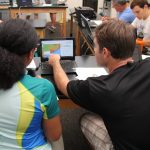“This is the first study to show that the extent to which students’ and teachers’ brainwaves are in sync during real-world learning can predict how well students retain information from class,” says lead author Ido Davidesco, an assistant professor at the University of Connecticut’s Neag School of Education and a former postdoctoral fellow at New York University, where the study was conducted.
The Connecticut State Department of Education is using reserves from its ARP and ESSER funds to establish the Center for Connecticut Education Research Collaboration (CCERC) to evaluate investments on an ongoing basis to determine efficacy, provide high-quality data, and guide resource decisions for the students most in need. The Center for Connecticut Education Research Collaboration is a partnership with researchers from the state’s universities, including the University of Connecticut, local representatives, and educators. The collaborative is unique in that it will build strong connections between the research and Connecticut’s districts, schools, and students.
A rapid research brief from Neag School’s Center for Education Policy Analysis, Research, and Evaluation (CEPARE) is mentioned.
Researchers from Connecticut higher education institutions are evaluating the program’s effect on attendance and other results. But interviews with families and staff members suggest a lasting impact.
An interdisciplinary group of UConn researchers is leading an effort to empower high school students to become “Eco-Digital” storytellers in their communities.
UConn researchers are key members in a cross-state educational COVID-19 collaboration, co-led by Neag School associate dean Morgaen Donaldson.
UConn researchers are key members in a cross-state educational COVID-19 collaboration, co-led by Neag School associate dean Morgaen Donaldson.
An interdisciplinary group of UConn researchers is leading an effort to empower high school students to become “Eco-Digital” storytellers in their communities.
Kathleen Lynch, an assistant professor at the University of Connecticut and coauthor of the meta-analysis, said the existing research shows not only that summer learning is an effective means of bolstering academic growth, but also a worthy recipient of finite COVID recovery dollars.
Michael Coyne, professor of educational psychology and chair of the Neag School’s Department of Educational Psychology, has served as a principal investigator since the original launch of the literacy research project in 2012


